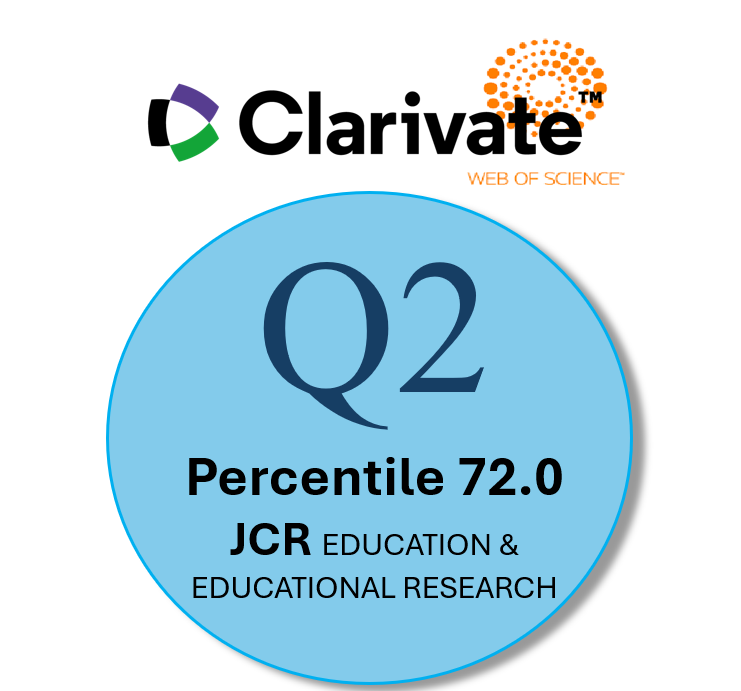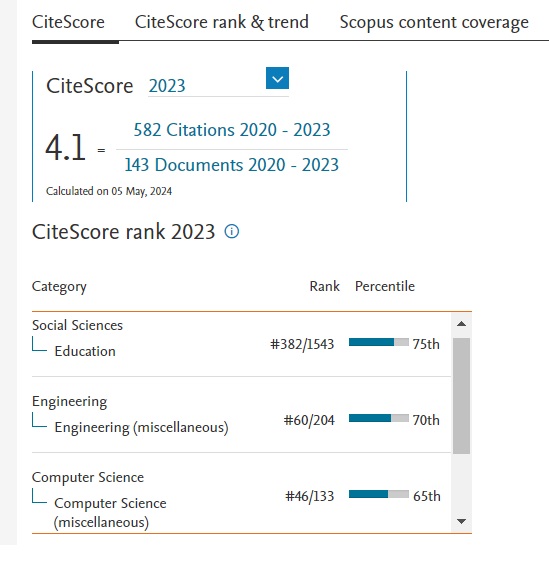Educación durante la crisis de COVID-19: Oportunidades y limitaciones del uso de Tecnología Educativa en países de bajos ingresos
Resumen
La pandemia de Covid-19 ha marcado el comienzo de un período de interrupción educativa a una escala sin precedentes. Durante este tiempo de crisis, la educación no funcionará como de costumbre y EdTech por sí sola no puede cerrar la brecha de aprendizaje. Serán maestros dedicados y educadores resilientes quienes se asegurarán de que el aprendizaje no se detenga, pero las herramientas de EdTech adecuadas podrían ayudarlos. Sin embargo, la brecha digital significa que el acceso a Internet y a las redes móviles varía mucho en los países de ingresos medios y bajos. En este documento de debate, exploramos algunas de las limitaciones clave de utilizar EdTech a escala para apoyar la educación en países de bajos ingresos en un momento de crisis, y destacamoslas oportunidades que han surgido hasta ahora, en un contexto que cambia rápidamente. Nos basamos en la evidencia y los ejemplos para fundamentar las decisiones políticas y de programación, pasando de la respuesta de emergencia inicial a la construcción de resiliencia a largo plazo, y planificando para diagnosticar y tratar las brechas de aprendizaje que han surgido durante la crisis.
Descargas
-
Resumen8250
-
PDF 3409
Citas
Akerlof, G.A. & Kranton, R.E. (2002). Identity and schooling: Some lessons for the economics of education. Journal of Economic Literature, 40(4), 1167–1201.
Angrist, N., Bergman, P., Brewster, C., & Matsheng, M. (2020). Stemming learning loss during the pandemic: A rapid randomized trial of a low-tech intervention in Botswana. Available at SSRN: doi: 10.2139/ssrn.3663098
Central Square Foundation (2020). Central Square Foundation website. https://www.centralsquarefoundation.org/
Centre for Education Innovations (2020). Know Zone. Centre for Education Innovations. https://educationinnovations.org/program/know-zone
Dahya, N. (2016). Education in conflict and crisis: How can technology make a difference? A landscape review. Bonn, Germany: Deutsche Gesellschaft für Internationale Zusammenarbeit (GIZ) GmbH. https://www.eccnetwork.net/sites/default/files/media/file/GIZ%20InDesign-Vorlage%20fu%CC%88r%20Publikationen%20%E2%80%93%20DIN%20A4%20hoch.pdf
Damani, K. (2020) Rapid evidence review: Accelerated learning and EdTech. The EdTech Hub. https://edtechhub.org/wp-content/uploads/2020/09/RER-Accelerated-Learning-and-EdTech.pdf
Damani, K. & Mitchell, J. (2020). Radio: Rapid evidence review. The EdTech Hub. doi: 10.5281/zenodo.3948149
David, R., Pellini, A., Jordan, K. & Philips, T. (2020). Education during the COVID-19 crisis: opportunities and constraints of using EdTech in low-income countries. Zenodo. doi: 10.5281/zenodo.3750976
de-Marcos, L., Garcia-Lopez, E. & Garcia-Cabot, A. (2016). On the effectiveness of game-like and social approaches in learning: Comparing educational gaming, gamification & social networking. Computers & Education, 95, 99–113.
DeStefano, J., Piper, B. & Stern, J. (2020). Calculating the educational impact of COVID-19: Closed schools, lost learning, unequal impact. RTI International. https://shared.rti.org/content/calculating-educational-impact-covid-19%C2%A0-closed-schools-lost-learning-unequal-impact
Dreesen, T., Akseer, S., Brossard, M., Dewan, P., Giraldo, J. P., Kamei, A., Mizunoya, S., & Santiago Ortiz, J. (2020). Promising practices for equitable remote learning: Emerging lessons from COVID-19 education responses in 127 countries. UNICEF. https://www.unicef-irc.org/publications/pdf/IRB%202020-10%20CL.pdf
EDC (2014). Learning in the Time of Ebola. EDC website. https://www.edc.org/learning-time-ebola
Eneza Education (2020). Eneza Education website. https://enezaeducation.com/
Engzell, P., Frey, A. & Verhagen, M. (2020). Learning inequality during the COVID-19 pandemic. SocArXiv. doi: 10.31235/osf.io/ve4z7
Filmer, D., Rogers, H., Angrist, N. & Sabarwal, S. (2020). Learning-Adjusted Years of Schooling (LAYS): Defining a new macro measure of education. Economics of Education Review, 77 (August 2020), 101971. doi: 10.1016/j.econedurev.2020.101971
Giannini, S. (2020). Covid-19 school closures around the world will hit girls hardest. UNESCO. https://en.unesco.org/news/covid-19-school-closures-around-world-will-hit-girls-hardest
Glennie, A., Stanley, I., Ollard, J. & Klingler-Vidra, R. (2020). Strategies for supporting inclusive innovation: Insights from South-East Asia. NESTA. https://www.nesta.org.uk/report/supporting-inclusive-innovation-se-asia/
Graham, A. & Sahlberg, P. (2020). Schools are moving online, but not all children start out digitally equal. The Conversation. https://theconversation.com/schools-are-moving-online-but-not-all-children-start-out-digitally-equal-134650
Hale, T., Webster, S., Petherick, A., Phillips, T. & Kira, B. (2020). Oxford COVID-19 government response tracker. Blavatnik School of Government. https://www.bsg.ox.ac.uk/research/research-projects/coronavirus-government-response-tracker
Hallgarten, J. (2020). Evidence on efforts to mitigate the negative educational impact of past disease outbreaks. K4D Helpdesk Report 793. Reading, UK: Education Development Trust.
Huang, W. H-Y. & Soman, D. (2013). A practitioner’s guide to gamification of education. Toronto, Canada: Rotman School of Management, University of Toronto. https://inside.rotman.utoronto.ca/behaviouraleconomicsinaction/files/2013/09/GuideGamificationEducationDec2013.pdf
ITU (2019). Measuring digital development: Facts and figures 2019. ITU Publications. https://www.itu.int/en/ITU-D/Statistics/Documents/facts/FactsFigures2019.pdf
Jalli, N. (2020). Lack of Internet access in southeast Asia poses challenges for students to study online amid COVID-19 pandemic. The Conversation. https://theconversation.com/lack-of-internet-access-in-southeast-asia-poses-challenges-for-students-to-study-online-amid-covid-19-pandemic-133787
Jordan, K. (in press). Covid-19 school closures in low- and middle-income countries: emergent perspectives on the role of educational technology. Accepted for publication in the Journal of Learning for Development.
Jordan, K. & Mitchell, J. (2020). Messaging apps, SMS & social media: Rapid evidence review. The EdTech Hub. http://doi.org/10.5281/zenodo.4058181
Khan Academy (2020). Khan Academy: Free online courses, lessons & practice. Khan Academy website. https://www.khanacademy.org/
KICD (2020). KICD on Twitter: ‘Let’s engage. For rich discussions on education matters. Https://T.Co/Qb1ooAc7ZF’, Twitter.
King, E. (2011). Education is fundamental to development and growth. The World Bank. https://blogs.worldbank.org/education/education-is-fundamental-to-development-and-growth
Lamba, K., & Reimers, F. (2020). Sierra Leone and Liberia: Rising Academy Network on air. The World Bank. http://documents1.worldbank.org/curated/en/182171599124695876/pdf/Sierra-Leone-and-Liberia-Rising-Academy-Network-on-Air.pdf
Major, L. & Francis, G.A. (2020). Technology-supported personalised learning: Rapid evidence review. The EdTech Hub. http://doi.org/10.5281/zenodo.3948175
MANAUS Consulting (2016). Assessing the use of technology and Khan Academy to improve educational outcomes in Sacatepéquez, Guatemala. Los Angeles, USA: MANAUS Consulting.
Mindspark (2020). Mindspark Website. https://mindspark.in/
Mundy, K. & Hares, S. (2020). Managing education systems during COVID-19: An open letter to a minister of education. Center For Global Development blog. https://www.cgdev.org/blog/managing-education-systems-during-covid-19-open-letter-minister-education
Mundy, K., Proulx, K., Janigan, K., Geva, E. & Fraser, C. (2014). Evaluation study on the early learning child-to-child programme. UNICEF. https://www.unicef.org/ethiopia/reports/evaluation-study-early-learning-child-child-programme
Muralidharan, K., Singh, A. & Ganimian, A.J. (2019). Disrupting education? Experimental evidence on technology-aided instruction in India. American Economic Review, 109(4), 1426–60.
National Portal of India (2020). DIKSHA. https://diksha.gov.in/explore
Neumann, M. & Wincewicz, K. (2016). TextTETEA — An SMS-based education service. In 2016 IEEE Global Humanitarian Technology Conference (GHTC), 312–15, 2016. doi: 10.1109/ghtc.2016.7857298
OECD (2016). Innovating education and educating for innovation: The power of digital technologies and skills. Paris, France: OECD Publishing. http://www.oecd.org/education/ceri/GEIS2016-Background-document.pdf
Onebillion (2020). Onecourse – One app for reading and numeracy. Onebillion website. https://onebillion.org/onecourse/app/
Open School BC (2020). Open School BC Home Page. https://www.openschool.bc.ca/
Pathways for Prosperity Commission (2019a). Managing education in the digital age: Policy brief. Oxford, UK: Pathways for Prosperity Commission. https://pathwayscommission.bsg.ox.ac.uk/sites/default/files/2019-09/Positive_disruption_policy_brief_on_education.pdf
Pathways for Prosperity Commission (2019b). Positive disruption: Health and education in a digital age. Oxford, UK: Pathways for Prosperity Commission. https://pathwayscommission.bsg.ox.ac.uk/positive-disruption
Piper, B., Destefano, J., Kinyanjui, E.M. & Ong’ele, S. (2018). Scaling up successfully: Lessons from Kenya’s Tusome National Literacy Program. Journal of Educational Change, 19(3), 293–321.
Pitchford, N.J., Chigeda, A. & Hubber, P.J. (2019). Interactive apps prevent gender discrepancies in early-grade mathematics in a low-income country in Sub-Sahara Africa. Developmental Science, 22(5), e12864. doi: 10.1111/desc.12864
RTI International (2016). Tusome early grade reading activity. RTI website. https://www.rti.org/impact/tusome-early-grade-reading-activity
Save Our Future (2020). Save our future: Averting an education catastrophe for the world's children. Education Commission. https://saveourfuture.world/wp-content/uploads/2020/10/Averting-an-Education-Catastrophe-for-the-Worlds-Children_SOF_White-Paper.pdf
Tauson, M. & Stannard, L. (2018). EdTech for learning in emergencies and displaced settings: A rigorous review and narrative synthesis. Save The Children. https://resourcecentre.savethechildren.net/node/13238/pdf/edtech-learning.pdf
The Economist (2020). How Covid-19 is interrupting children’s education. The Economist. https://www.economist.com/international/2020/03/19/how-covid-19-is-interrupting-childrens-education
Ubongo (2020). Ubongo Kids. https://ubongokids.com/
UNESCO (2020a). COVID-19 educational disruption and response. UNESCO. https://en.unesco.org/covid19/educationresponse
UNESCO (2020b). Adverse consequences of school closures. UNESCO. https://en.unesco.org/themes/education-emergencies/coronavirus-school-closures/consequences
UNESCO Institute of Statistics (2020). UIS Statistics. http://data.uis.unesco.org/#
UNICEF (2020a). How teenagers can protect their mental health during coronavirus (COVID-19). 6 strategies for teens facing a new (temporary) normal. UNICEF. https://www.unicef.org/coronavirus/how-teenagers-can-protect-their-mental-health-during-coronavirus-covid-19
UNICEF (2020b). School mapping. UNICEF. https://www.unicef.org/innovation/school-mapping
Vegas, E. (2020). School closures, government responses, and learning inequality around the world during COVID-19. Brookings. https://www.brookings.edu/research/school-closures-government-responses-and-learning-inequality-around-the-world-during-covid-19/
Watson, J. (2020). Learning through television in low income contexts: Mitigating the impact of Coronavirus (COVID-19). The EdTech Hub blog. https://edtechhub.org/2020/03/31/learning-through-television-in-low-income-contexts-mitigating-the-impact-of-covid-19/
Watson, J., Hennessy, S. & Vignoles, A. (in press). The relationship between educational television and mathematics capability in Tanzania. Accepted for publication in the British Journal of Educational Technology.
Watson, J. & McIntyre, N. (2020). Educational television: Rapid evidence review. The EdTech Hub. doi: 10.5281/zenodo.3956366
World Bank (2020) Remote learning and COVID-19: The use of educational technologies at scale across an education system as a result of massive school closings in response to the COVID-19 pandemic to enable distance education and online learning. The World Bank. http://documents1.worldbank.org/curated/en/266811584657843186/pdf/Rapid-Response-Briefing-Note-Remote-Learning-and-COVID-19-Outbreak.pdf
You, M. (2020). The social support networks stepping up in Coronavirus-stricken China. openDemocracy. https://www.opendemocracy.net/en/oureconomy/social-support-networks-springing-coronavirus-stricken-china/
- 09-01-2021 (5)
- 09-01-2021 (4)
- 09-01-2021 (3)
- 08-01-2021 (2)
- 13-11-2020 (1)
Derechos de autor 2020 Revista de Educación a Distancia (RED)

Esta obra está bajo una licencia internacional Creative Commons Atribución-NoComercial 4.0.
Las obras que se publican en esta revista están sujetas a los siguientes términos:
1. El Servicio de Publicaciones de la Universidad de Murcia (la editorial) conserva los derechos patrimoniales (copyright) de las obras publicadas, y favorece y permite la reutilización de las mismas bajo la licencia de uso indicada en el punto 2.
2. Las obras se publican en la edición electrónica de la revista bajo una licencia Creative Commons Reconocimiento-NoComercial-SinObraDerivada 3.0 España (texto legal). Se pueden copiar, usar, difundir, transmitir y exponer públicamente, siempre que: i) se cite la autoría y la fuente original de su publicación (revista, editorial y URL de la obra); ii) no se usen para fines comerciales; iii) se mencione la existencia y especificaciones de esta licencia de uso.
3. Condiciones de auto-archivo. Se permite y se anima a los autores a difundir electrónicamente las versiones pre-print (versión antes de ser evaluada) y/o post-print (versión evaluada y aceptada para su publicación) de sus obras antes de su publicación, ya que favorece su circulación y difusión más temprana y con ello un posible aumento en su citación y alcance entre la comunidad académica. Color RoMEO: verde.














